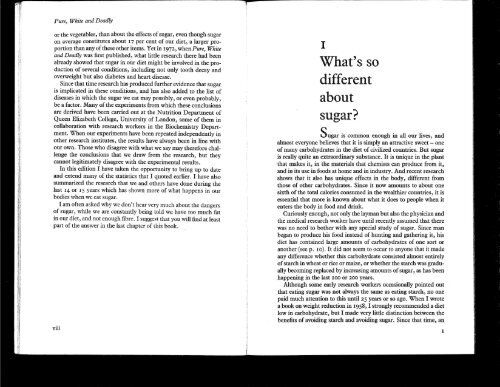John_Yudkin_-_Pure_White_and_Deadly_revised_1986_OCR
John_Yudkin_-_Pure_White_and_Deadly_revised_1986_OCR
John_Yudkin_-_Pure_White_and_Deadly_revised_1986_OCR
You also want an ePaper? Increase the reach of your titles
YUMPU automatically turns print PDFs into web optimized ePapers that Google loves.
<strong>Pure</strong>, <strong>White</strong> <strong>and</strong> <strong>Deadly</strong><br />
or the vegetables, than about the effects of sugar, even though sugar<br />
on average constitutes about 17 per cent of our diet, a larger proportion<br />
than any of these other items. Yet in 1972, when <strong>Pure</strong>, <strong>White</strong><br />
<strong>and</strong> <strong>Deadly</strong> was first published, what little research there had been<br />
already showed that sugar in our diet might be involved in the production<br />
of several conditions, including not only tooth decay <strong>and</strong><br />
overweight but also diabetes <strong>and</strong> heart disease.<br />
Since that time research has produced further evidence that sugar<br />
is implicated in these conditions, <strong>and</strong> has also added to the list of<br />
diseases in which the sugar we eat may possibly, or even probably,<br />
be a factor. Many ofthe experiments from which these conclusions<br />
are derived have been carried out at the Nutrition Department of<br />
Queen Elizabeth College, University of London, some of them in<br />
collaboration with research workers in the Biochemistry Department.<br />
When our experiments have been repeated independently in<br />
other research institutes, the results have always been in line with<br />
our own. Those who disagree with what we say may therefore challenge<br />
the conclusions that we draw from the research, but they<br />
cannot legitimately disagree with the experimental results.<br />
In this edition I have taken the opportunity to bring up to date<br />
<strong>and</strong> extend many of the statistics that I quoted earlier. I have also<br />
summarized the research that we <strong>and</strong> others have done during the<br />
last 14 or IS years which has shown more of what happens in our<br />
bodies when we eat sugar.<br />
I am often asked why we don't hear very much about the dangers<br />
of sugar, while we are constantly being told we have too much fat<br />
in our diet, <strong>and</strong> not enough fibre. I suggest that you will find at least<br />
part of the answer in the last chapter of this book.<br />
viii<br />
I<br />
What's so<br />
different<br />
about<br />
sugar?<br />
Sugar is common enough in all our lives, <strong>and</strong><br />
almost everyone believes that it is simply an attractive sweet - one<br />
of many carbohydrates in the diet of civilized countries. But sugar<br />
is really quite an extraordinary substance. It is unique in the plant<br />
that makes it, in the materials that chemists can produce from it,<br />
<strong>and</strong> in its use in foods at home <strong>and</strong> in industry. And recent research<br />
shows that it also has unique effects in the body, different from<br />
those of other carbohydrates. Since it now amounts to about one<br />
sixth of the total calories consumed in the wealthier countries, it is<br />
essential that more is known about what it does to people when it<br />
enters the body in food <strong>and</strong> drink.<br />
Curiously enough, not only the layman but also the physician <strong>and</strong><br />
the medical research worker have until recently assumed that there<br />
was no need to bother with any special study of sugar. Since man<br />
began to produce his food instead of hunting <strong>and</strong> gathering it, his<br />
diet has contained large amounts of carbohydrates of one sort or<br />
another (see p. 10). It did not seem to occur to anyone that it made<br />
any difference whether this carbohydrate consisted almost entirely<br />
of starch in wheat or rice or maize, or whether the starch was gradually<br />
becoming replaced by increasing amounts of sugar, as has been<br />
happening in the last 100 or 200 years.<br />
Although some early research workers occasionally pointed out<br />
that eating sugar was not always the same as eating starch, no one<br />
paid much attention to this until 25 years or so ago. When I wrote<br />
a book on weight reduction in 1958, I strongly recommended a diet<br />
low in carbohydrate, but I made very little distinction between the<br />
benefits of avoiding starch <strong>and</strong> avoiding sugar. Since that time, an<br />
I



